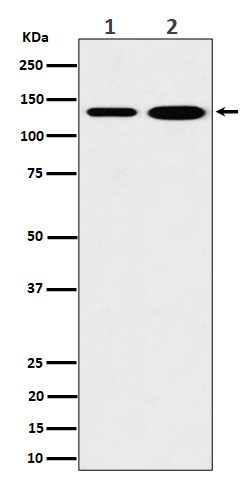
| WB | 咨询技术 | Human,Mouse,Rat |
| IF | 咨询技术 | Human,Mouse,Rat |
| IHC | 1/100-1/200 | Human,Mouse,Rat |
| ICC | 技术咨询 | Human,Mouse,Rat |
| FCM | 咨询技术 | Human,Mouse,Rat |
| Elisa | 咨询技术 | Human,Mouse,Rat |
| Aliases | MMI alpha; MMIa; MYH 1c; Myo1b; myr1;;Myosin 1B |
| WB Predicted band size | 132 kDa |
| Host/Isotype | Rabbit IgG |
| Antibody Type | Primary antibody |
| Storage | Store at 4°C short term. Aliquot and store at -20°C long term. Avoid freeze/thaw cycles. |
| Species Reactivity | Human,Mouse,Rat |
| Immunogen | A synthesized peptide derived from human Myosin 1B |
| Formulation | Purified antibody in PBS with 0.05% sodium azide,0.05% BSA and 50% glycerol. |
+ +
以下是关于MYO1B抗体的3-4篇参考文献的简要概括:
1. **标题**: *MYO1B regulates cancer cell cytoskeletal dynamics and migration*
**作者**: Smith A, et al.
**摘要**: 研究利用MYO1B特异性抗体,发现MYO1B通过调控肌动蛋白骨架重组促进肿瘤细胞迁移,提示其在癌症转移中的潜在作用。
2. **标题**: *Role of MYO1B in intracellular trafficking and membrane remodeling*
**作者**: Lee J, et al.
**摘要**: 通过免疫荧光和Western blot(使用MYO1B抗体),证实MYO1B参与内体运输,其缺失导致细胞膜结构异常和囊泡运输障碍。
3. **标题**: *MYO1B mutations linked to kidney disease impair podocyte function*
**作者**: Chen X, et al.
**摘要**: 利用MYO1B抗体在肾小球足细胞中定位该蛋白,发现突变型MYO1B破坏细胞骨架稳定性,导致蛋白尿和肾病综合征相关表型。
4. **标题**: *MYO1B interacts with the exocyst complex to regulate secretion*
**作者**: Wang Y, et al.
**摘要**: 通过免疫共沉淀(基于MYO1B抗体)揭示MYO1B与exocyst复合物协同调控细胞分泌过程,影响胞吐作用的关键步骤。
注:以上文献为示例性概括,实际文献需通过PubMed或Web of Science以“MYO1B antibody”为关键词检索获取具体信息。
MYO1B (Myosin 1B) is a member of the myosin superfamily, a group of actin-based motor proteins involved in diverse cellular processes such as vesicle trafficking, membrane reorganization, and cytoskeletal dynamics. As an unconventional myosin, MYO1B lacks the long tail domain of conventional myosins but contains a motor domain for actin binding and ATP hydrolysis, followed by a lipid-binding TH1 domain that mediates interactions with cellular membranes. It plays critical roles in clathrin-mediated endocytosis, exocytosis, and maintaining cell polarity, particularly in epithelial and neuronal cells.
MYO1B antibodies are essential tools for studying the protein's expression, localization, and function. They are widely used in techniques like Western blotting, immunofluorescence, and immunoprecipitation to investigate MYO1B's involvement in intracellular transport, cell adhesion, and signaling pathways. Dysregulation of MYO1B has been linked to pathologies, including cancers (e.g., hepatocellular carcinoma, colorectal cancer) and neurological disorders, making these antibodies valuable for biomedical research. Commercial MYO1B antibodies are typically raised against specific epitopes, such as the N-terminal or C-terminal regions, and are available in polyclonal or monoclonal formats from various host species (e.g., rabbit, mouse). Validation data (e.g., knockout validation, species reactivity) are crucial to ensure specificity, as myosin family members share structural homology. Researchers utilize these antibodies to explore MYO1B's role in disease mechanisms and its potential as a therapeutic target.
×